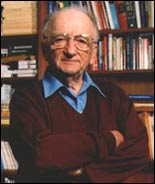Building on Nuremberg — the International Criminal Court
With the establishment of a permanent International Criminal Court (ICC) in 2002, Nuremberg prosecutors like Benjamin Ferencz say the true promise of Nuremberg is only now coming to fruition.
Ferencz, who is now 82, was on hand at the United Nations headquarters in New York earlier this year when 66 countries ratified the treaty establishing the ICC.

Ben Ferencz says the true promise of Nuremberg is only now coming to fruition. Photo: Ben Ferencz |
Ferencz was in buoyant spirits when he mounted the podium with UN officials and other diplomats to mark the ICC's founding. "We were building on the Nuremberg foundation, which was to condemn aggression as the most serious war crime in the world because it is during time of war, all the other crimes are committed," Ferencz says. "To condemn genocide, to condemn crimes against humanity, those were the great precedents established at Nuremberg, and then affirmed by the UN and then of course the world went back to killing as usual."
One nation was conspicuously absent from the UN ceremony this year: The United States. The country that played such a central role in the Nuremberg trials opposes the new International Criminal Court. The Bush administration says that no American soldier should ever face trial in anything but a U.S. court.
Benjamin Ferencz strongly disagrees: "What the United States is saying is that we don't want the rule of law. I think that is dangerous, very dangerous. Because we cannot lay down a law for the United States and not for the rest of the world. That doesn't fly. Justice Jackson made that clear at Nuremberg. Law must apply to everyone equally or it's not law at all. Those who are pushing the other view have a misguided idea of what law is all about. They also have a misguided conception of how to safeguard the welfare and justice and rights for citizens everywhere."
Next: Part II Imposing Justice from the Hague 

